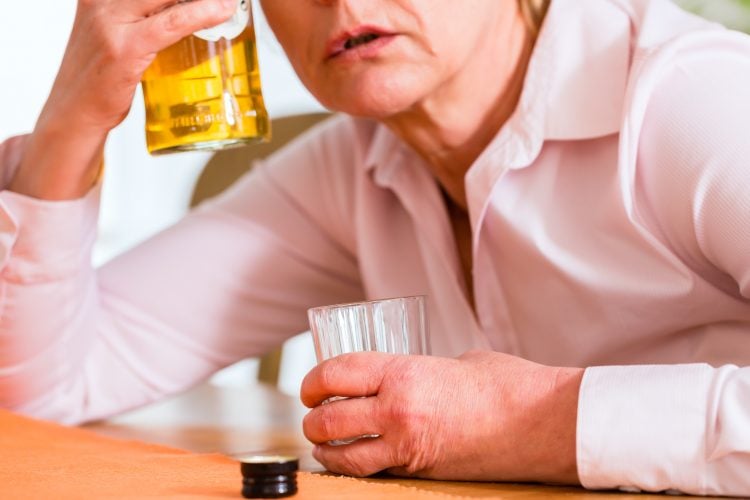
If addiction is a brain disease, then researchers should be able to determine what kinds of medications for this disease work—and how they work, too. That’s the idea underlying a new study that’s being put together by Dr. Nora Volkow at the National Institute on Drug Abuse, or NIDA for short. She wants to take a closer look at the current medications being used to treat addiction and find out just what kinds of effects they have on the brains of people struggling with addiction. This first-of-its-kind study will compare brain scan images before, during, and after treatment with standard MAT medications for addiction.

If you have recently been struggling with a drinking problem, you’re not alone: heavy alcohol use is currently on a steep rise in the United States. A newly published study and editorial in the JAMA Psychiatry journal showed evidence of huge increases in general alcohol use, high-risk (heavy, binge) drinking, and alcohol use disorders (addiction).
The study revealed a variety of upward trends in alcohol use, noting that socioeconomically vulnerable groups have been especially affected by the rise in drinking problems. When disadvantaged populations in the U.S. are already suffering from a runaway opioid epidemic, an increase in alcohol abuse and dependency can only compound the misery of those who are in need of help.
U.S. House mulls deal to repeal addiction coverage guarantee
Republican congressional leaders proposed a change to their health care replacement bill that would remove the requirement for insurance companies to provide coverage for mental health and substance use treatment. The lawmakers are considering scrapping the “ten essential health benefits” in effort to garner more votes for the American Health Care Act, which would repeal and replace the Affordable Care Act.
The change would affect individual market plans, but the AHCA in its current form had already done away with the essential health benefits protection for Medicaid plans. The law would also gradually roll back the Medicaid expansion through which many have been able to access addiction treatment services. One recent report by the Foundation for a Healthy Kentucky found that Kentuckians newly covered by the Medicaid expansion saw a 740 percent increase in substance use treatment services.
A vote on the health care bill is expected to take place today, with the outcome uncertain. Lawmakers have faced criticism for how the bill would roll back addiction coverage and access to addiction services during the ongoing epidemic of opioid abuse and overdose.
Spring breakers at risk of encountering $5 overdose pill
Officials in Pinellas County, Florida, have issued a warning about pills that look like Xanax but contain the highly potent fentanyl. Users could be completely unaware that the pills contain the potentially fatal substance, and officials have linked the pills to nine deaths in recent weeks. They say the pills are so potent that a single pill could induce a fatal overdose. The officials noted that the situation is especially dangerous given how cheaply the pills can be obtained. One pill is said to cost just five dollars. Those going on spring break in the region should be wary of taking any pills recreationally, as well as knowing the risks of mixing opioids with other substances.
Kentucky doubles down on drug harm reduction services
While increasing access to addiction treatment is essential to countering the opioid epidemic, harm reduction services are also a vitally important aspect to fixing the country’s serious drug problems. New services in two Kentucky regions aim to enhance Kentucky’s harm reduction abilities. In Northern Kentucky, community leaders are looking at a convenient medication disposal service as a way of intervening before some addictions get started. Because many have become addicted first by using medications that were legally prescribed, easy disposal of excess medications could stop them getting into the wrong hands and leading to new addictions. The disposal pouches destroy the drugs placed inside them and can be thrown away by the consumer. Officials hope that distributing the pouches for free across Northern Kentucky will lead to a reduction in addiction sufferers.
In Madison County, Kentucky, the health department announced plans to introduce a mobile needle exchange program. The service will build on Kentucky’s growing resource of needle exchanges, with at least 15 other such programs operating in the state. These programs are effective at harm reduction, reducing the number of needles that could be infected with a diseases like the hepatitis virus or bacteria that lead to dangerous infections. In addition, the clean needles that will be distributed will be one-time use only, discouraging the dangerous practices of sharing or reusing needles. Needle exchange programs are often beneficial not only for harm reduction, but also for creating points of contact for drug users to receive encouragement to seek treatment.
Want more addiction-related stories? Subscribe to the Stepworks Connect Newsletter to receive the latest articles on addiction and recovery!
Stepworks Connect Newsletter
Header image by Gage Skidmore is licensed under CC BY-SA 2.0.
The above image is owned by Trainer Academy
If you’re aware of the opioid addiction epidemic, you’ve probably heard the word “naloxone.” This medication, which reverses an overdose from opioid drugs, has been central to efforts to combat rising rates of overdose deaths. Many efforts to address the crisis have focused on getting forms of this overdose aid into the hands of anyone who might be involved in an overdose situation. But one medical device company is taking heat for a dramatic hike in the price of a popular naloxone injector device.
We know that addiction is a family disease because of its negative effects on family relationships. But a new study reported by The New York Times suggests that parents who use opioids might actually experience suppressed parental instincts in the brain. The findings suggest that there is a neurochemical reason behind the common-sense knowledge that severe drug abuse can result in neglect of those we love the most.
This week, a video campaign showing stories of heroin addiction was unveiled by the US Attorney’s Office for the Eastern District of Kentucky, according to WKYT. The initial campaign includes four videos providing unique, personal perspectives on how heroin and opioid addiction affects lives. These stories of substance use, dependency, and recovery have the chance of speaking to those who don’t know the risks of the heroin epidemic or haven’t yet faced up to an active addiction.
According to the reporting by WKYT, the US Attorney’s Office hopes the initiative will succeed in educating those in Eastern Kentucky about the scope of the opioid and heroin crisis. The videos are being distributed to thousands in the eastern portion of the state, with the hope that they will receive wide exposure in schools and local communities.
The videos showcase different perspectives from real people who have had life-altering experiences with heroin use. One of the videos, titled, “Heroin is Hell,” shows the story Blake Gumm, whose prospects for a professional football career were closed off after an arrest related to heroin use. In his story, he offers profound testimony on the potential consequences of heroin addiction and how a relapse can turn your life upside down. The video also shows another man who avoided jail time and made the decision to seek treatment, showing what’s possible with hope and the desire for change.
Some of the videos in the initiative focus on particular issues or perspectives. The video “Heroin Hurts” looks at a tragic and uncomfortable subject: heroin overdose deaths. These stories are devastating, but facing the reality of drug addiction might help others change before it’s too late. The video “Heroin is Here” looks at the heroin epidemic from the perspective of officials in the legal and law enforcement fields, taking a broader factual view. Finally, “Heroin’s Hold” is a long-form video that incorporates the interviewees from all three short videos, going deeper into how the heroin and opioid epidemic is affecting Eastern Kentucky.
After you watch these videos, we’d love to get your take. Did you learn something about heroin or addiction that you didn’t know before? Do you think this campaign will help others to seek treatment for addiction? Get involved in the conversation on our Facebook page! This is a subject that affects all of us.
Top image by Eric Molina is licensed under CC BY 2.0
“Those we are losing to the opioid epidemic are our children, our siblings, our friends, our neighbors and our fellow Americans,” Attorney General Loretta Lynch said, in prepared remarks to an audience at the University of Kentucky on Tuesday. The head of the Justice Department was in Kentucky for two events organized to galvanize public support for a renewed campaign to end the national heroin and prescription opioid epidemic.
Casey’s Law has been on the books for 12 years, but it remains a little-understood resource for making loved ones find treatment for addiction. The Kentucky law hasn’t been used widely, because even if people are aware of it, they can be daunted by the legal process they’re thinking about setting in motion. Whether or not one ends up making use of the law, it’s important that more people understand what it is and how it works. In this Stepworks blog post, we’ve compiled some recent news stories and explainers that shed light on many important Casey’s Law questions.
The Courier-Journal’s 7 myths about Casey’s Law questions common misperceptions
This helpful article attempts to dispel some of the common Casey’s Law questions people have when thinking about filing a petition. It provides some answers to loved ones’ questions about the extent of their responsibilities once they decide to file. This is a good place to start if you’ve heard of Casey’s Law but don’t know much about the process of filing a petition and securing treatment.
Another piece by The Courier-Journal lets Experts explain Ky law to force drug treatment
Over the summer Louisville’s Courier-Journal hosted a public forum on Kentucky’s heroin crisis, where experts fielded questions from members of the community. In this article, the paper has collected the Casey’s Law questions and answers from the event. One of the answers highlights the gap in implementation of the law across the state, as well as how County Attorney Mike O’Connell is attempting to encourage wider understanding and use of this tool for loved ones. Take a look at this article for a wider scope on the current use of Casey’s Law, as well as for questions about what you can do to encourage long-term recovery after court-ordered treatment.
Central Ky.’s Advocate Messenger highlights costs in FIGHT: Casey’s Law expensive solution to drug problem
Filing a Casey’s Law petition to get a loved one into treatment is often a last resort for concerned parents, family members, or friends of drug users. That’s partly explained by the lack of knowledge and education about the law, but there are also real hurdles to consider. This article covers a recent meeting between a Danville public attorney and the group Families Into Getting Help Together, or FIGHT, which addressed Casey’s Law questions. It urges readers to be aware that there can be high costs involved in the process from court fees, in addition to the cost of treatment itself. Although there are resources in the state for those who can’t afford to pay for treatment, there’s not always a guarantee that free or low-cost treatment will be available to the petitioner. Read this article for a sober understanding of why Casey’s Law isn’t in very wide use.
WKYT covers a true story of how Casey’s Law saved daughter’s life
Casey’s Law might not be the easiest path to recovery for a loved one struggling with addiction, but for many people it may be a life-saving intervention. Lately the heroin crisis appears to have deepened, with recent waves of heroin overdoses and prescription opioid overdoses. It’s created a new urgency to steer people into treatment, even if that comes at some cost. This article provides a personal account of a Kenton County family’s struggle with the decision to petition to have their daughter court-ordered to get treatment for drug use. Reading this piece provides perspective into the thoughts and internal struggles of both the petitioner and the person for whom treatment is being sought.
If you’re thinking about filing a Casey’s Law petition to make a loved one enter treatment for drug dependency, and you’re interested in learning about addiction treatment at one of Stepworks’ 30-day residential facilities in Kentucky, please call our intake line at (800) 545-9031.
Image by Andres Rodriguez is licensed under CC BY-SA 2.0
In the upcoming week, Lexington police officers plan to begin carrying a potentially life-saving medication to counteract Kentucky drug overdoses, according The Lexington Herald-Leader.
In past weeks there have been numerous reports of increases in drug overdoses, in the state of Kentucky and beyond its borders. Over the long Labor Day weekend, 15 Kentuckians were reported to have suffered from a heroin overdose. Although that number may not be as high as some officials expected given the recent surge in overdoses, a tragic fact remained: 12 of the 15 people who overdosed died as a consequence. And these are the known cases. This story provides some information about why we don’t know the exact number of Kentucky drug overdoses treated due to the process of reporting patient data.


